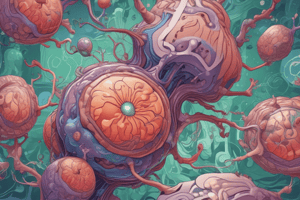Podcast
Questions and Answers
Which organelle is responsible for energy generation in a typical animal cell?
Which organelle is responsible for energy generation in a typical animal cell?
- Ribosomes
- Endoplasmic reticulum
- Mitochondria (correct)
- Lysosomes
What is the main function of chloroplasts in plant cells?
What is the main function of chloroplasts in plant cells?
- Energy generation
- Waste disposal
- Photosynthesis (correct)
- Protein synthesis
Which structure is crucial for packaging proteins in a typical animal cell?
Which structure is crucial for packaging proteins in a typical animal cell?
- Lysosomes
- Mitochondria
- Golgi complex (correct)
- Ribosomes
What type of junction allows direct ion exchange between adjacent cells?
What type of junction allows direct ion exchange between adjacent cells?
Which chemical messengers help convey information between groups of cells in multicellular organisms?
Which chemical messengers help convey information between groups of cells in multicellular organisms?
Where is the genetic material typically located in an animal cell?
Where is the genetic material typically located in an animal cell?
What is the main purpose of mitosis in cell division?
What is the main purpose of mitosis in cell division?
How does meiosis differ from mitosis in terms of its outcome?
How does meiosis differ from mitosis in terms of its outcome?
What is the significance of tight regulation during cell division?
What is the significance of tight regulation during cell division?
How does the differentiation process contribute to biological complexity?
How does the differentiation process contribute to biological complexity?
Why is understanding cell biology essential for developing novel treatments and therapies?
Why is understanding cell biology essential for developing novel treatments and therapies?
How does the study of cells relate to human health and disease?
How does the study of cells relate to human health and disease?
Study Notes
Exploring Life's Building Blocks: A Journey through Cell Biology
Cells – tiny building blocks of life – are fundamental units that make up every living organism on our planet. As we delve into the intricate realm known as cell biology, numerous fascinating discoveries await us to better understand how these microscopic marvels function and interact with each other.
Anatomy of Cells
A typical animal cell is composed of several key structures like the nucleus, containing genetic material; endoplasmic reticulum, involved in protein synthesis; mitochondria, responsible for energy generation; ribosomes, sites of protein production; Golgi complex, crucial for packaging proteins; and various membrane systems such as lysosomes, peroxisomes, and vesicles. Plant cells also possess unique components like chloroplasts, which perform photosynthesis, and vacuoles used for storage and waste disposal.
Communication between Cells
Beyond individual cellular functions, communication plays a vital role in maintaining homeostasis within multicellular organisms. Signaling pathways involving chemical messengers called hormones help convey information from one group of cells to another. For example, insulin produced by pancreatic beta cells regulates blood sugar levels, while growth factors facilitate tissue repair and development. In addition to signaling molecules, gap junctions allow direct ion exchange between adjacent cells.
Cell Division: Reproduction and Growth
The process of cell division involves duplicating DNA followed by segregation of chromosomes during mitosis or meiosis to form new daughter cells. Mitosis allows for growth and regeneration, while meiosis results in gamete formation leading to reproduction. Errors occurring during cell division can lead to mutations, potentially contributing to diseases such as cancer or genetic disorders. Therefore, tight regulation during this process ensures accurate duplication and inheritance.
Specialization and Differentiation
As embryonic stem cells develop into mature, specialized somatic cells, their structure and physiological characteristics become increasingly specific to their roles within tissues and organs. This differentiation process forms the basis for the diverse range of biological complexity found across an array of species.
Understanding cell biology deepens our appreciation of human health and disease, providing essential knowledge for developing novel treatments and therapies. The study of cells places us at the interface of molecular processes that govern life itself.
Studying That Suits You
Use AI to generate personalized quizzes and flashcards to suit your learning preferences.
Description
Delve into the world of cell biology to discover the intricate anatomy of cells, the crucial communication pathways between them, and the processes of cell division for reproduction and growth. Explore how cells specialize and differentiate to fulfill specific functions within organisms.




